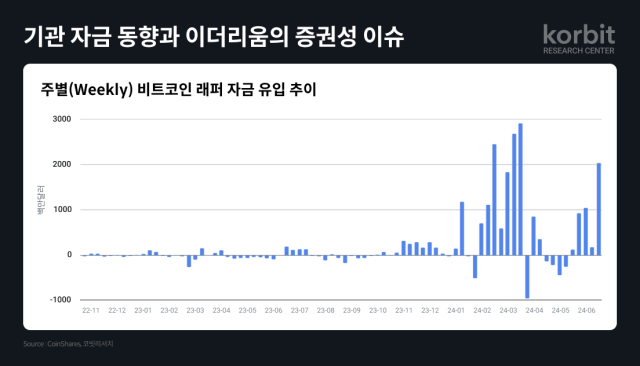
Korbit Research Center of Korbit, a domestic virtual asset exchange, announced on the 17th that it has published a report analyzing institutional funding trends and Ethereum (ETH) securities issues over the past three months.
According to the report, the number of Bitcoin (BTC) wrappers in short-term institutional investor funds has increased since the third week of February. BTC Wrapper is a product created in the form of a traditional financial asset to achieve the same investment effect as BTC. BTC wrapper funds have been temporarily outflowing from the Grayscale Spot ETF (GBTC) since last March, two months after the approval of the BTC Spot Exchange Traded Fund (ETF). However, the total assets under management (AUM) of BTC wrapper funds, which began receiving inflows last month, increased by more than 90% compared to the first week of January.
Related articles
- Nexon holding company NXC exits virtual asset business... There are rumors that Bitstamp and Korbit will be sold after a change in ownership.
- Korbit, which is running at a loss, is considering investing in L2 ‘Silicon’ as a solution.
- Following Paycoin and Korbit, Coinone is also listed... Pay attention to additional listings
In terms of long-term institutional investors, the size of virtual asset fund operating funds in the first quarter of this year is the same as the previous quarter. However, as institutional interest in layer 2 solutions, BTC infrastructure, and real-world assets (RWA) grows, the amount of blockchain venture capital (VC) investment increased by about 20% compared to the previous quarter.
The first quarter institutional trading volume of Coinbase, an American virtual asset exchange, was $265 billion, up 105% from the previous quarter. Coinbase Prime, which provides institutional custody, financing, and staking, recorded its highest trading volume ever. The active participation of institutions was also noticeable in the BTC futures market of the Chicago Mercantile Exchange (CME). CME outstanding contracts reached an all-time high in the second week of March.
Meanwhile, Korbit Research Center analyzed ETH securities issues in the case of 'Prometheum', a virtual asset securities platform that launched an ETH custody service in the United States last month. This is because when trading ETH on Prometheum, issues have emerged as to whether it can comply with the regulations of the U.S. Securities and Exchange Commission (SEC) and whether ETH securities are recognized.
Korbit Research Center determined that “Prometheum caused unintended controversy in the market.” Due to Prometheum, ETH futures on exchanges licensed by the U.S. Commodity Futures Trading Commission (CFTC) can be converted from 'non-securities product-based futures' to 'securities futures', thereby conflicting with the regulations of the SEC and CFTC. Analysis suggests that this may cause confusion for existing ETH futures providers and sellers.
Choi Yoon-young, head of Korbit Research Center, said, “Institutional fund inflows have shown a solid flow over the past three months, and this trend is expected to continue. The case of Prometheum highlights the controversy over the securities nature of virtual assets and suggests the need for clear regulations.” He said.
- Reporter Choi Jae-heon
- chsn12@decenter.kr
< Copyright ⓒ Decenter, unauthorized reproduction and redistribution prohibited >








